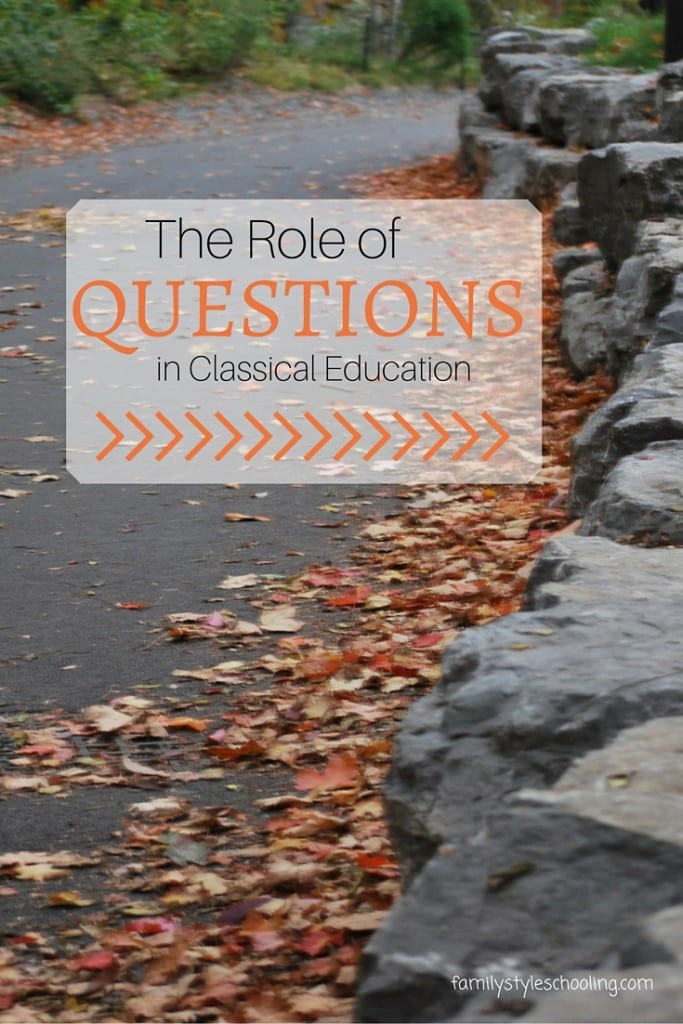The Role of Questions in Classical Education
Questions play a major role in Classical Education, and recently I've observed that each of the classical arts in the Trivium have specific types of questions that draw out each of the art's specific purposes.
Classical Education and the Trivium
In Latin, the "trivium" means three roads or three paths to learning. These three paths are grammar, dialectic (or logic), and rhetoric. The best way for me to understand these three roads is through Proverbs 24:3-4:
Proverbs 24:3-4
By wisdom a house is built, and through understanding it is established;
through knowledge its rooms are filled with rare and beautiful treasures.
The art of grammar relates to knowledge. This is not simply English grammar but the facts about any subject or topic you are studying.
The art of dialectic (sometimes called the art of logic) relates to understanding. This understanding comes from connecting the facts together and seeking deeper insights into what you're studying.
Finally, the art of rhetoric relates to wisdom. Once you have the facts and gleaned insights from connecting those facts together, you can respond by acting rightly, speaking eloquently, or writing persuasively in relation to your topic of study.
These three paths are not three options but rather a braid of three strands that, when used together, create a fuller approach to learning.
The Bible frequently connects these three paths. Here are some examples:
Verses:
Proverbs 2:6 For the Lord gives wisdom; from his mouth come knowledge and understanding.
Proverbs 3:19-20 By wisdom the Lord laid the earth's foundations, by understanding he set the heavens in place; by his knowledge the watery depths were divided, and the clouds let drop the dew.
Proverbs 3:21-22 My son, do not let wisdom and understanding out of your sight, preserve sound judgment and discretion; they will be life for you, an ornament to grace your neck.
Proverbs 4:5 Get wisdom, get understanding; do not forget my words or turn away from them.
Proverbs 9:10 The fear of the Lord is the beginning of wisdom, and knowledge of the Holy One is understanding.
Proverbs 19:8 The one who gets wisdom loves life; the one who cherishes understanding will soon prosper.
I want to pause really quickly to differentiate between the Trivium as arts versus the Trivium as stages. Dorothy Sayers was the first to apply the arts of the Trivium to developmental stages. She noted that at different ages, students respond more to a specific art. Young children love memory work and repetition, young teens love discussing and arguing, and older teens love telling you what they know and expressing themselves. While the Classical Conversations programs are designed around these stages of development, the arts are by no means exclusive to one stage. You need all three to achieve that fullness of learning.
Understandably your students will lean to the art to which they are most developmentally suited; in other words, your grammar-aged student will soak up facts like a sponge, then be content with asking a few questions and express wisdom in simple statements. Their dialectic siblings will brush over the grammar quickly as they desire to focus on connecting ideas and thoughts and begin to write basic persuasive papers. The end goal would be to have lifelong learners who, although they live in the rhetorical stage, know they don't know everything and understand the key to learning to live rightly is learning to think rightly. That's where questions become a powerful tool.

So let's take a look at how questions change through the different arts.
Questions in the Art of Grammar
It is so important to get the facts straight. That's where questions are important for the grammar of a topic.
For example, I could ask:
Q: What is the shortest verse in the Bible?
A: Jesus wept.
Q: Where is it found in the Bible?
A: John 11:35
Q: Who wrote the book?
A: John, the apostle
There is no disputing this information, but it is important to note. If we stop with questions like these, we have knowledge without understanding. If we dwell in knowledge-based questions, we will cultivate pride and stifle wisdom. We must ask more questions in order to seek wisdom above all else.
Questions in the Art of Dialectic
A different type of question must be applied now if you want to understand what you are studying. This type of question is best asked in a conversation with others because it keeps you from being narrow-minded. There are more questions you can ask here:
Who is Jesus?
What is weeping?
How is Jesus like God?
How is Jesus like man?
Why was Jesus weeping?
What happened before?
What happened after?
If you think these questions are too simple to be of help, try answering a couple. Is there a single answer to: "Why was Jesus weeping?" If we can't know for sure, do we avoid asking the question?
What about: "Who is Jesus?" Do we really have to ask this question? I think a better question might be, should we ever stop asking this question? The reality is that we are finite beings that only know a sliver of what is knowable. We have an infinite amount of information that would take an eternity to understand. That's why we keep asking, thinking, and discussing. If we truly desire to gain understanding, we have to ask the simple questions that take us to the depths of the well of understanding.
Questions in the Art of Rhetoric
While many stop at knowledge, it is just as easy to be satisfied with a good conversation and never ask any questions that draw out wisdom. This develops the theoretical life. David Hicks proposes: "The end of education is not thinking; it is acting."
Questions that must be asked in the art of Rhetoric might be:
How then shall we live?
Is there an example for me to follow?
Is there an example for me to avoid?
What should I do with my new understanding?
What audience needs to know and understand these ideas, and how can I best communicate the ideas to them?
For some, these questions could be answered by an attitude adjustment or a modified behavior. As they grow and mature, their answers could look like writing an essay, giving a speech, or leading a discussion encouraging others to understand their discoveries.
Following any of the three paths on their own at the exclusion of the others will yield an unbalanced learner.
The grammarian, without wisdom and understanding, becomes prideful.
The logician, without knowledge and wisdom, becomes theoretical.
The rhetorician, without knowledge and understanding, becomes shallow.

How do you use questions to enrich your education?
Do you find yourself getting stuck on one path to the exclusion of another?
Betsy Strauss is an unexpected homeschooler, mother of three, who is in a relationship with a sweet man for life. She loves reading books, drinking coffee, and learning anything with her kids.



I like your statements at the end…”The grammarian without…” etc. Those are good statements to consider!
I remember when I first heard that the trivium did not originate as stages but as arts. I was so confused because I had never heard anything other than the idea of stages! 😉
Thanks Amy! I too was introduced to classical education from the stages viewpoint, but when I learned they were also arts, my understanding was enriched. Thanks for stopping by!
[…] The Role of Questions in Classical Education from Family Style Schooling […]
Really loved this post. Thanks for sharing your thoughts.
Are there rant books that I could read that would expand on these areas ?
I really loved Leigh Bortin’s series on Classical Education: The Core, The Question, and The Conversation.